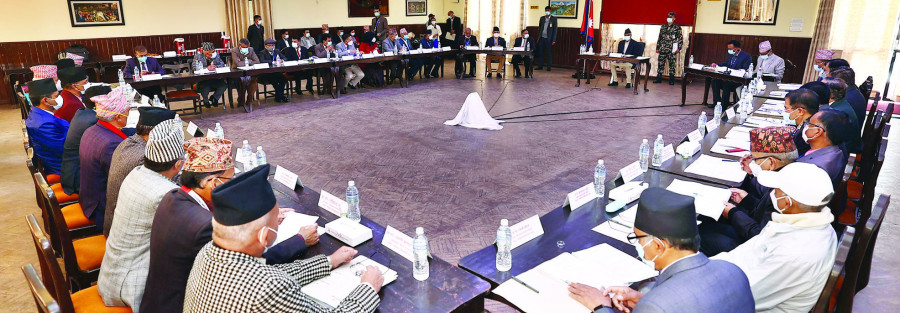National
Deuba-led Tribhuvan University meeting decides to hire teachers without open competition
Experts say such a practice will promote incompetence and ruin students’ future.
Binod Ghimire
The first government formed after the people’s movement 2006 decided to hire 1,380 part-time and 460 “course contact” teachers in the Tribhuvan University as teaching assistants.
Then Prime Minister Girija Prasad Koirala on August 24, 2006 signed an agreement with the teachers who held a hunger strike at Ratna Park demanding they should be appointed without going through any competition. Most of the 1,840 teachers, who got fixed-term appointments in the oldest varsity of the country, got to teach as part-timers without facing any tests.
Eight years later, in 2014, the assistant teaching staff pressured the university administration to make special arrangements for their permanent posting without a competitive test. The university’s Service Commission in March 2014 called vacancies for competitive tests. However, the teachers unions locked then Vice-Chancellor Hira Bahadur Maharjan, Rector Guna Nidhi Neupane and Registrar Chandra Mani Poudel in a room at the Research Centre for Educational Innovation and Development for 27 hours in April 2014, and ultimately forcing them to sign an agreement to revise the vacancy and call an internal competition.
However, 480 of them couldn’t succeed in the internal competition and several other competitions held later.
On Tuesday, the assembly meeting of the university decided to give them yet another opportunity to get permanent posting without having to sit competitive examinations. The assembly led by Prime Minister Sher Bahadur Deuba, an ex-officio chancellor at the university, took the decision which allows them to become permanent lecturers if they can get the minimum pass marks.
The Service Commission of the university will publish a vacancy notice as per Tuesday’s agreement. The teaching assistants had continuously been demanding for their permanent appointment through internal competition.
The student unions, however, have taken a serious exception to the decision. Seven student unions including those affiliated to the five ruling parties have started protests against the decision. In an attempt to pressure the university administration, the unions have padlocked the office of the vice-chancellor, rector and registrar. “The assembly’s decision is unacceptable. This will further ruin the university which is struggling to deliver quality education,” Tika Ram Bhandari, a central committee member of the CPN (Unified Socialist)-affiliated All Nepal National Free Students Union, told the Post. “The hiring must be done through competitive testing.”
The student leaders say the university can never progress without hiring fresh and competitive human resources. Bhandari said they are planning to meet the top leadership from all the parties for revocation of the decision.
The Nepal Students’ Union, a student wing of the ruling Nepali Congress, too is in the protest. A member of the assembly said the decision was taken as per the wish of the prime minister. “Nobody could oppose the prime minister,” said the member on the condition of anonymity. “I am personally against any decision that obstructs open competition.”
The former officials at the university say nobody who wants to see Tribhuvan University progress would support the idea of giving the same people multiple chances for permanent posting. “Only incompetent people need internal competition for appointment. By appointing incompetent people, the Tribhuvan University is not just ruining its reputation but also the future of hundreds of students,” Kamal Krishna Joshi, a former vice-chancellor at the Tribhuvan University and a former vice-chairperson of the University Grants Commission, told the Post. “The university should call an open competition and allow the 480 also to participate if they wish.”




 8.79°C Kathmandu
8.79°C Kathmandu















